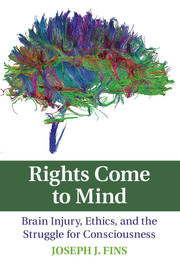Book contents
- Frontmatter
- Dedication
- Epigraph
- Contents
- Miscellaneous Frontmatter
- Acknowledgments
- Introduction
- 1 Decisions
- 2 The Injury
- 3 Coming to Terms with Brain Injury
- 4 The Origins of the Vegetative State
- 5 A Shift since Quinlan
- 6 Maggie's Wishes
- 7 Something Happened in Arkansas
- 8 From PVS to MCS
- 9 Leaving the Hospital
- 10 Heather's Story
- 11 Neuroimaging and Neuroscience in the Public Mind
- 12 Contractures and Contradictions: Medical Necessity and the Injured Brain
- 13 Minds, Monuments, and Moments
- 14 Heads and Hearts, Toil and Tears
- 15 What Do Families Want?
- 16 Deep Brain Stimulation in MCS
- 17 Mending Our Brains, Minding Our Ethics
- 18 It's Still Freedom
- 19 Maggie Is in Town
- 20 When Consciousness Becomes Prosthetic
- 21 The Rights of Mind
- 22 A Call for Advocacy
- Epilogue
- Notes
- In Memoriam
- Index
10 - Heather's Story
Published online by Cambridge University Press: 05 September 2015
- Frontmatter
- Dedication
- Epigraph
- Contents
- Miscellaneous Frontmatter
- Acknowledgments
- Introduction
- 1 Decisions
- 2 The Injury
- 3 Coming to Terms with Brain Injury
- 4 The Origins of the Vegetative State
- 5 A Shift since Quinlan
- 6 Maggie's Wishes
- 7 Something Happened in Arkansas
- 8 From PVS to MCS
- 9 Leaving the Hospital
- 10 Heather's Story
- 11 Neuroimaging and Neuroscience in the Public Mind
- 12 Contractures and Contradictions: Medical Necessity and the Injured Brain
- 13 Minds, Monuments, and Moments
- 14 Heads and Hearts, Toil and Tears
- 15 What Do Families Want?
- 16 Deep Brain Stimulation in MCS
- 17 Mending Our Brains, Minding Our Ethics
- 18 It's Still Freedom
- 19 Maggie Is in Town
- 20 When Consciousness Becomes Prosthetic
- 21 The Rights of Mind
- 22 A Call for Advocacy
- Epilogue
- Notes
- In Memoriam
- Index
Summary
Finding Placement
Finding placement for a MCS patient who is severely disabled but still conscious can be difficult for social workers. Paradoxically, it is sometimes easier to find a bed if the patient is vegetative and not in MCS. The “better” diagnosis would require more specialized placement where additional elements of care such as cognitive rehabilitation and physical therapy would be available. The more gravely injured patient, ironically, places less burden on overtaxed facilities.
In one instance, I heard of a case in which a patient with traumatic brain injury, Heather Sykes, was alleged to have been deliberately misdiagnosed, or at least mislabeled as vegetative, in order to facilitate discharge to chronic care. According to her mother, Cynthia (Cindy) Sykes's retelling of her story, she was discharged from the hospital diagnosed as being in the permanent vegetative state, even though Cindy did not believe it.
I met Cindy when we were both speakers at a regional conference on TBI in the fall of 2007. She and an advanced practice nurse partnered up to tell Heather's story. It was a compelling account consistent in many ways with what I had learned from the families I had been interviewing at Cornell. As with Terry Wallis, and so many other families we have interviewed, Cindy thought she saw purposeful behaviors that would give Heather an MCS and not a vegetative diagnosis.
And that is where our experiences diverged because Cindy alleged that her daughter's misdiagnosis was more than the all too common error of omission where an MCS patient is mistaken as vegetative. Instead, she asserted that her ongoing vegetative diagnosis had became one of commission, a deliberate attempt to misrepresent her condition, and chronic care needs, in order to facilitate Heather's nursing home placement. If true, it would be an act that some might construe as diagnostic fraud orchestrated to deal with a chronic care system unprepared to accept seriously disabled but conscious patients. It is a sobering and sad story that I share with the generous permission of Cindy Sykes.
- Type
- Chapter
- Information
- Rights Come to MindBrain Injury, Ethics, and the Struggle for Consciousness, pp. 97 - 110Publisher: Cambridge University PressPrint publication year: 2015



